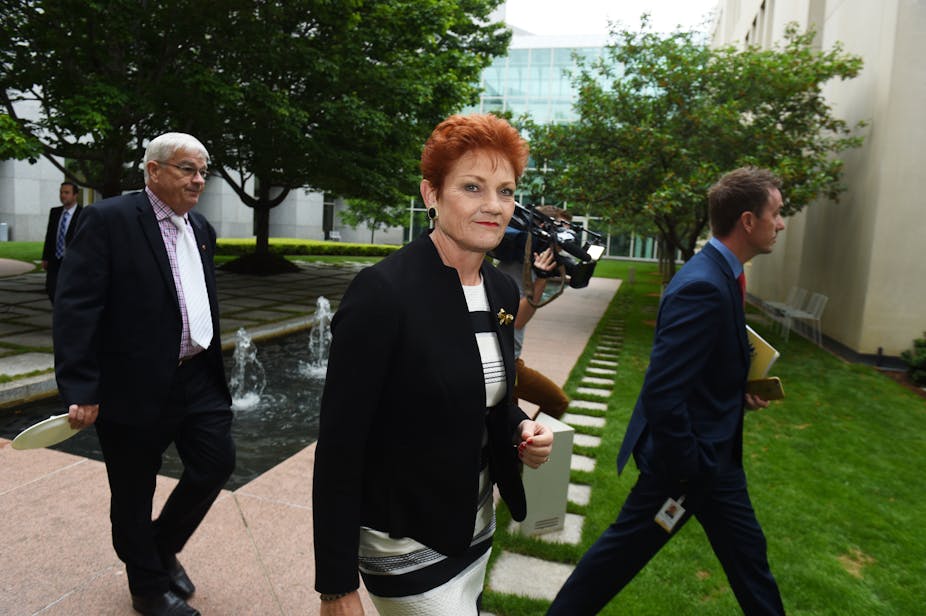When microparties that include politicians we might charitably call “characters” suddenly get clout, things are likely to go badly.
This week’s dispute between One Nation senator Rod Culleton and his leader carries overtones of the past which would be alarming for the newly empowered Pauline Hanson.
The public squabbling, with Hanson trying to assert her authority and Culleton his independence, brought to mind both the experience of the Palmer United Party and the splintering of One Nation after it won 11 seats at the 1998 Queensland election.
Hanson’s immediate issue with the free-wheeling Culleton was his writing to a Queensland magistrate seeking to have a court case adjourned.
“We are watching with interest the conduct of all judicial officers Australia-wide after discovering the High Court has not been conducting its business in the name of the Queen,” he wrote. “As a safeguard against a possible injustice, could I respectfully ask that you adjourn the matter until the constitutional position of all courts is clarified.”
The Queensland government has asked police to investigate whether this could amount to an attempt to pervert the course of justice.
Culleton’s non-attendance at her office when summoned for a please explain led Hanson to issue a blunt call to heel. “Rod, excuse me, I’m party leader, I expect you to come to my office, right. And, you know, it’s about being a team player,” she said.
But Rod is not a “team player”, and won’t become one.
Finally, after farcical scenes that were candy for the cameras, he and Hanson met early Wednesday afternoon. But soon after he was on Sky saying they’d talked about why she as party leader had allowed him “to go up the cattle race” – a reference to her backing the Senate’s referring to the High Court the question of his eligibility to be elected in July.
Culleton said he would now go to party leaders in the Senate to try to have this referral revoked and the matter reconsidered by the Senate. Good luck with that.
One Nation in the Senate is less a team and more a loose collection of individuals.
The party is, however, now a powerful political force, and one that both sides of politics fear into the future.
In his frank comments last weekend – when he didn’t realise the mic was on – Attorney-General George Brandis confided to Victorian Liberal Party president Michael Kroger his view that One Nation was likely to win “quite a few seats” in the Queensland election, due in 2018.
Brandis noted that One Nation’s Queensland vote had spiked to about 16%, with its strength in heartland areas of both Nationals and ALP.
Former Queensland Liberal National Party premier Campbell Newman argues One Nation’s vote is understated, and predicts it will win six to 11 state seats and be in a balance-of-power position.
More immediately, attention will be focused on One Nation’s performance at the election early next year in Culleton’s home state of Western Australia.
A poll commissioned by the Chamber of Minerals and Energy of Western Australia has One Nation on 16% in the Pilbara electorate of Nationals leader Brendon Grylls, who has alienated the mining industry with a proposed tax slug on Rio Tinto and BHP Billiton.
It’s unclear how the Culleton affair will play into the party’s standing in WA.
In general, the times suit One Nation. It can tap into the cynicism and discontent in a sour electorate, and capitalise on the stress being felt by many people in regional areas. It has been given a boost by Trumpism.
Having four senators – which means that when the government needs the non-Green crossbench One Nation has to be a key player – delivers substantial clout to Hanson, who is also politically savvier than when she was in the House of Representatives two decades ago.
But she has to be able to keep her bloc together. Clive Palmer’s PUP – which began the last parliamentary term with three senators and an alliance with a fourth – started out with the ability to make or break government measures and extract concessions.
As senators peeled off, PUP’s influence disintegrated. The senators operated as individuals; by the end of the term there was a single PUP in the Senate (Palmer himself was in the House of Representatives).
Having been the “big new thing” of the 2013 election, PUP was a nothing at the 2016 poll.
Hanson’s One Nation was the biggest new thing of the last election, bigger in the Senate than the Nick Xenophon Team, which won three Senate spots.
To retain her momentum Hanson needs the internal glue to stick. If her Senate team fell apart, her ability to run strongly in the Queensland election would come into question.
From the Coalition’s viewpoint, long- and short-term interests potentially collide. Any splintering of the Hanson Senate group would, by weakening the party, be electorally beneficial to both sides of politics. On the other hand, in the Senate the government finds dealing with blocs less complicated than negotiating with individuals.
The Hanson bloc has mainly buttressed the government – but on Wednesday things fell apart. The government’s planned A$5 rise in the departure tax – part of its backpacker compromise package – was defeated 31-30 when it received only two of the four One Nation votes.
The result was a surprise to government and opposition – both had thought the Coalition had the numbers. But Hanson and her NSW senator Brian Burston were missing.
The government said the vote would have been carried if the two senators had made it to the chamber on time and so it would seek to have the tax hike brought back for another vote on Thursday morning.
For Hanson, the missed vote capped a very bad day at the office.

